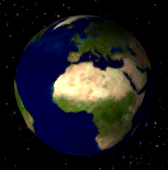Why does the Earth rotate from West to East?
 Rotating Earth
Rotating Earth
We say that "the sun rises in the East and sets in the West", which means that the Earth is rotating from West to East.
But why does it rotate in that direction? Is it because of the Earth's magentic field?
Would it be possible to slow down the Earth's rotation till it stops, or even moves in the other direction?
No vote yet
1 vote
Easy Math Editor
This discussion board is a place to discuss our Daily Challenges and the math and science related to those challenges. Explanations are more than just a solution — they should explain the steps and thinking strategies that you used to obtain the solution. Comments should further the discussion of math and science.
When posting on Brilliant:
*italics*or_italics_**bold**or__bold__paragraph 1
paragraph 2
[example link](https://brilliant.org)> This is a quote# I indented these lines # 4 spaces, and now they show # up as a code block. print "hello world"\(...\)or\[...\]to ensure proper formatting.2 \times 32^{34}a_{i-1}\frac{2}{3}\sqrt{2}\sum_{i=1}^3\sin \theta\boxed{123}Comments
When the Earth was being formed, the particles and gases that were clumping together started spinning from rock impacts. Slowly, the planet became bigger and bigger, a core was formed which continued the spinning motion and it has been spinning ever since.
Yes, it is possible to slow the Earth's rotation. El Nino can slow Earth's rotation by a few milliseconds. If you increase the energy to the required amount and 'push' the energy in the opposite direction to the rotation of the Earth, you can stop the Earth and make it go the other way.
Log in to reply
I agree that makes the most sense. But, if we assume that the rock impacts were uniformly distributed over the surface (and also that the rock impacts have a uniform spin), then wouldn't their effects cancel out, and cause the planet to be stationary?
If it's due to the distribution of rocks in the area, then shouldn't (large enough) bodies that are near us have the same spin rate? However, a moon day is actually 29.5 Earth days, which means that the moon spins much slower than the earth.
Log in to reply
Not quite. You see, the rock impacts don't have to be uniform to give the planet angular momentum and even if they come from the opposite direction the angular velocity won't be decelerated.
You can't possibly slow it down I think, because the whole universe is following the law of conservation of angular momentum which requires them to be constantly in motion. but since it is bound by Sun's gravity , it develops a centrifugal force around it's axis. According the statement to it since the Big Bang every particle has been in constant motion. Another point is , since the Earth is itself made of particles, their combined gravity will cause it it to spin around itself which we call rotation. This point has been emphasized in Stephen Hawking's "A Brief History Of Time"
to stop the rotation of the earth if a force is applied more than the escape velocity of sun , then it can move outside the universe.